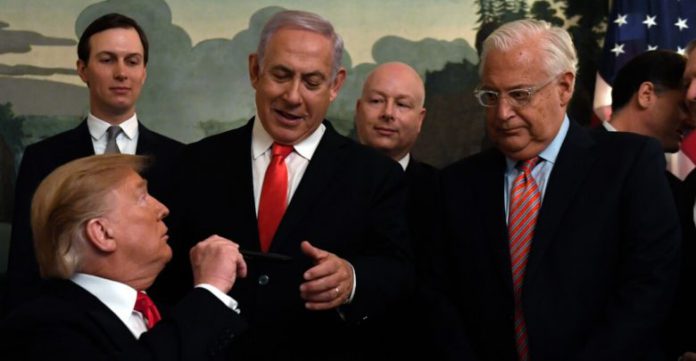After the formal announcement of Deal of the Century plan by Donald Trump and the covert and overt efforts of the so-called Hebrew-Arab Coalition to implement its responses to this great historic event have been varied at regional and international levels. Trump’s security team and the Zionist regime’s lobby in the Senate and the White House are working to take full advantage of the recent turmoil in the Middle East, especially due to widespread political tensions and the likelihood of a military confrontation between Iran and the US following the martyrdom of Lt. General Suleimani and convince Palestinian groups to accept the plan because of more passivity of the Arabs and the split in the Islamic world (two main pillars Iran and Saudi Arabia).
Deal of the Century aims at further undermining the Jihadi groups to pave the ground for stabilization of the supremacy of the Zionist regime as a triumphant element in the region and by overlooking the rights of the Palestinians including the return of Palestinians to their homeland, disarmament of the Resistance and recognition of Holy Quds as capital of the Zionists.
The situation has entered a new phase with Donald Trump’s impeachment over Ukraine Gate scandal and his personal desire to create a new Middle East front against Iran, though his impeachment ultimately failed and he remained in the White House.
It was in this situation that Trump was forced to flee the heavy attacks of public opinion and weakening of the US status in the Middle East, including the Iraqi parliament’s emphasis on US troop pullout, with the demands of Zionist extremist groups backed by Gerard Kouchner (his son-in-law) and Benjamin Netanyahu the Israeli prime minister who faces multiple charges because of financial and ethical corruption.
Apparently, given Saudi Arabia’s reluctance to give a positive response to Iran’s green lights on resumption of diplomatic relations and launching comprehensive regional talks, as well as widening of the gap between Turkey and Qatar with Saudi ally sheikhdoms on regional issues including the fate of Palestine, Tel Aviv finds the conditions suitable to put further pressure on the Palestinians and is trying to force the Palestinians to withdraw and accept the new conditions by using Trump’s tendency to provide more military and economic backing to Tel Aviv and by shaping Hebrew-Arab coalition.
On the other hand, Saudi Arabia, led by Mohammed bin Salman, seeks to expand political and economic ties with the Zionist regime and intends to portray Iran instead of Israel as the enemy of Arabs by adding Israel to the emerging power blocs in the Middle East, presenting a new model of friendships and hostilities in the region, forgetting the aspirations of the Palestinian people and complete indifference towards their aspirations.
So, before holding a conference of the Organization of Islamic Cooperation on how to respond to the Deal of the Century, Bin Salman tried to persuade the leaders of the PA to accept the plan. However, the united reaction of the Palestinian groups in condemning the move on the one hand, and distancing of some countries close to Riyadh (Kuwait-Oman-Qatar) and the strong opposition of Turkey and Iraq, on the other hand, made Saudi Arabia takes a passive measure and by organizing the Jeddah Meeting suffice to issue a formal resolution in support of the demands of the Palestinian people.
However, refusing to issue the visa to the Iranian delegation to attend the regional conference indicates that Saudi Arabia, despite all the measures taken to limit Iran’s regional influence, feels threatened by Iran’s public diplomacy and strong opposition to Deal of the Century. So against any legal logic, Riyadh blocked Iran’s presence in the event. On the other hand, Turkey is faced with a more serious challenge on regional issues with Saudi Arabia. Recep Tayyip Erdogan has publicly opposed the plan, seeking to regain power and legitimize his regional policy.
In such an atmosphere, as the gap between the Muslim world deepens over the vital issue of Palestine, we will witness a growing show of power by the Zionist regime. Also, the weak statement issued by the participants in the Jeddah session will not only fail to strengthen the Palestinian cause but will see tensions rise in Gaza and the West Bank and between Jihadist groups and Zionist military.










0 Comments